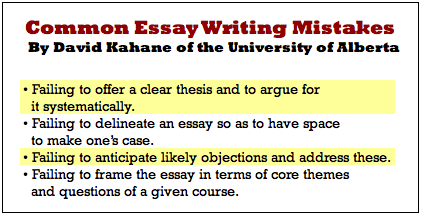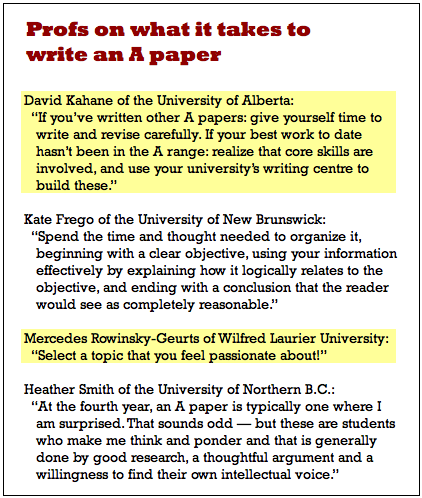Do your prof a favour: write better!
Profs across the country plead for better written essays, and offer tips to help you get there
Share
Writing good papers isn’t just a way to get better grades; it’s doing your part to solve an ongoing humanitarian crisis.
Think of your poor professors and imagine what it’s like to have to consecutively read, mark and make intelligent comments about fifty papers on the same topic. Now imagine how much more painful it must be if most of the papers are poorly written.
Oh, the humanity!
 We surveyed past victims of poor paper writing across the country and together, they responded with what amounts to an impassioned plea for mercy: they ask that you, the students, for the sake of your grades, learn to write readable, well-organized papers.
We surveyed past victims of poor paper writing across the country and together, they responded with what amounts to an impassioned plea for mercy: they ask that you, the students, for the sake of your grades, learn to write readable, well-organized papers.
Or, in the words of professor Sorel Friedman of Université de Montréal: “Imagine that your paper is the very last one a professor is going to correct at the end of a very long evening. Try to write something original, or at the very least, clear and logical.”
Academic originality isn’t something we can help you with in the scope of this column, but with our professors’ help, we’ll take a crack at clarity and logicality.
First and foremost, if you’re going to take the time to write hundreds or thousands of words, you should make sure that you’re writing about something. Rambling on from an arbitrary starting point toward no destination in particular is no way to score good grades.
If you have been given a question to address, read it carefully several times and then be absolutely positive that you answer that question and not another. This isn’t politics; you don’t get full marks for answering the question you wish they’d asked instead of the one they asked.
If you’re not given a question, then you’ll have to come up with a thesis, which is a statement of something that you are going to argue to be true. Your subject matter should be relatively focused, so that it’s possible to cover it in depth in the scope of the paper you’re writing, but not so focused that you’ll run out of interesting things to say. If you’re unsure about the appropriateness of your thesis, this is a great time to talk to your prof or TA.
A well-defined thesis will make it much easier for you to organize your paper. You are arguing a point, so your paper should have a logical flow that takes the reader from the thesis statement, through a series of coherent, well-ordered arguments toward your destination, which is the conclusion that the thesis statement is true. This is the nuts and bolts of what an essay is and you’ll save yourself a lot of time and trouble if you keep this in mind throughout the process.
Draft an outline of your paper that details the steps you need to take to reach your conclusion. Planning your paper in advance will make it easier to stick to advancing your argument and to avoid rambling off onto tangents. “Don’t try to say everything you know about the subject, whether it’s relevant or not in hope that you will impress the reader with your knowledge,” advises Simon Fraser University’s Malgorzata Dubiel.
When you start writing, remember that clarity is much more important than style. Short, simple, to-the-point sentences and clear language will do more good than verbose, run-on sentences that may confuse the reader. Again, the point is to communicate an argument, not to wow the reader with your vocabulary. If you feel your writing is weak, or your marks on past papers have indicated that it is, consider going to your university’s writing centre for help.
 Many students make the mistake of relying too heavily on quotations and paraphrases from their sources. Your prof is looking for your analysis of the sources, not merely a list of other people’s opinions, even if they do support your argument. Excessive paraphrasing can also lead to awkward wording, as you try to bend your source’s phrasing to fit your context. More importantly, going overboard with paraphrasing can lead you to problems with plagiarism.
Many students make the mistake of relying too heavily on quotations and paraphrases from their sources. Your prof is looking for your analysis of the sources, not merely a list of other people’s opinions, even if they do support your argument. Excessive paraphrasing can also lead to awkward wording, as you try to bend your source’s phrasing to fit your context. More importantly, going overboard with paraphrasing can lead you to problems with plagiarism.
Reason through each of your points clearly, in a way that an intelligent person who is not a professor could follow. “Remember, you know what you want to say, but a person who reads your paper has to understand what you are saying,” Dubiel says. “The person who marks your paper knows the subject, but you need to convince them that you know it, too!”
The best way to find out if someone else will understand your writing is to get someone else to read it, preferably a fellow student. As embarrassing as it may be, it’s a good idea to read your paper aloud to another student, to help catch awkward language. “The ear will catch what the eye cannot,” says Sarah Keefer of Trent University. “The reading student will hear unbalanced sentences, wrong words, ‘clangers’ and grammatical aberrations as well as finding that perhaps an idea doesn’t come through as clearly as is needed.”
Be prepared to write several drafts of your paper. This means starting work on it well in advance of your deadline, which is a foreign concept to many students, but the difference it makes in your mark will be worth the discipline it requires. Oftentimes, the best thing you can do with a piece of writing is to put it away for a day and then come back to it; mistakes and awkward phrasings you couldn’t see the day before suddenly become apparent after a night’s sleep.
Finally, you’ll have to print your paper and turn it in. If your professor has specified a format she would like to receive the paper, follow the format. At the very least, make sure the paper is neat, organized, presented in a readable font, and turned in on time. Grading papers is a subjective affair, and you can’t afford to waste any of your prof’s goodwill on avoidable sloppiness. Make sure all of your sources are properly cited and that your bibliography is complete, and you’ll avoid any academic misconduct hearings.
Conclusions are important as well, and sometimes surprisingly difficult to write.
Err…
Therefore, you should follow the above advice to become an excellent essay writer.
(Whew! Writing about how to write; what a way to make a writer self-conscious.)